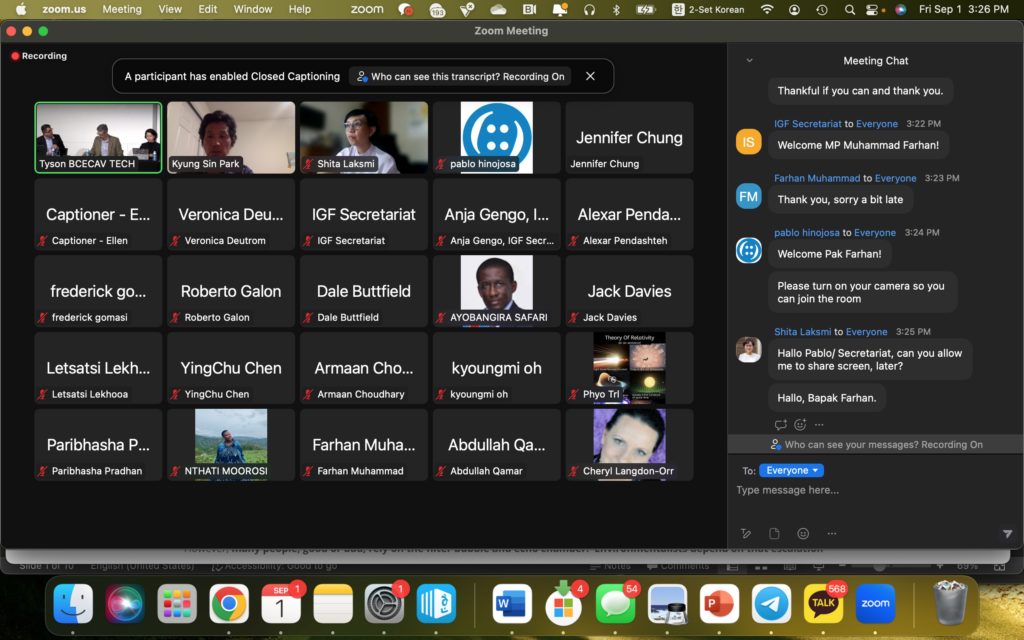Open Net co-hosted with IGF a APrIGF Parliamentary Track session on September 1, 2023 discussing the policymakers’ challenges in responding to hate speech and disinformation. K.S. Park discussed the implausibility of criminalization of disinformation as a solution and the need to make the platforms do the work. According to him, the gravamen of the disinformation problem is not the content itself but its propagation through the online space and the resulting harms, (i.e., whether mediated through public figures or coordinated otherwise). For CSOs to work more closely with platforms, the platforms must be more transparent about their content moderation practices because, in order to deal with the scalability problem cited often by platforms as reasons for non-responsiveness, there must be more cohesion and synchronization between CSO flaggers/free speech advocates and tech moderators. Visibility of what platforms do over disinformative contents in general gives CSOs an idea about how to and whether to prioritize their inquiries to platforms, i.e., which disinformative postings or which government takedowns CSOs will inquire to the platforms about first, and also an idea about how to and whether to hold platforms accountable on specific postings/takedowns. As Article 19 has argued in its letter to META in 2022, transparency is one pillar of UNGP on Business and Human Rights and transparency on content moderation is an important of human rights impact assessment for digital platforms. The event was attended by parliamentarians from various countries in the Asia Pacific region (25 online; 11 offline (6 female and 5 male)). The concept note and agenda for the event to follow below.

Internet Governance Forum 2023 | Regional Parliamentary track
The Contribution of Parliamentarians to the Internet We Want: An Asia Pacific Perspective
The initiative is focused on facilitating dialogue and exchanges on key digital policy issues among Members of Parliaments (MPs), and between MPs and other stakeholders from within and beyond the Asian continent.
Target audience
● The symposium is dedicated to members of national parliaments from Asian and Pacific countries and members from other regions who would like to attend or contribute. Focus will be given to the Parliamentarians in the information and communication technology (ICT) related committees at the national or regional parliaments, who work on digital affairs and Internet policy issues.
Objectives
- Familiarize MPs with the IGF space and the broader international ecosystem for Internet governance and digital policy. Encourage them to actively contribute to relevant regional and international processes.
- Prepare MPs for participation in the IGF 2023 meeting and the dedicated parliamentary track, as well as future IGF meetings and activities.
- Update MPs on a set of Internet governance and digital policy issues relevant to Asian Pacific countries. Facilitate dialogue on these issues with other parliamentarians from around the world, as well as with relevant international and regional organisations from different stakeholder groups (intergovernmental organisations, the technical community, private sector, civil society).
- Discuss the relevance of legislative work in shaping the region’s digital future. Highlight issues that need to be considered when legislation for the digital space is developed (e.g., avoiding unintended consequences for the open and global nature of the Internet).
- Facilitate cooperation and exchanges of good practices with MPs from national and regional parliaments, as well as parliaments from other regions, which have advanced legislative work on digital policy issues.
- Expose the MPs to the various digital-related UN: Agenda 2030, the Roadmap for Digital Cooperation, the Our Common Agenda Report, the Global Digital Compact. Co-organizers
● The symposium is co-organised by the UN Department of Economic and Social Affairs (DESA), the IGF Secretariat, the Australian Government and the PACIGF and APrIGF Secretariat.
Countering misinformation and disinformation in fast-growing online communities
Countries and regions struggle to combat misinformation and disinformation, while ensuring that freedom of opinion and expression are protected and respected. Addressing misinformation and disinformation requires a multi-faceted approach involving various stakeholders, including governments, technology platforms, media organizations, and the civil society. This session explores how parliamentarians can help tackle the surge of disinformation and misinformation in the digital space.
- ✓ How does dis- and misinformation in online spaces affect the region?
- ✓ What challenges do policymakers face when developing legislations?
- ✓ How can countries effectively address online dis- and misinformation? Speakers
- Mr. Richard Windeyer, Deputy Secretary – Communications and Media Group, Department of Infrastructure, Transport, Regional Development and Communications and the Arts, Australia (onsite)
- Ms. Kyoungmi Oh, Researcher at Open Net (onsite)
- Mr. Kyung Sin Park, Executive Director, Open Net; Professor, Korea University Law School (onsite)
- Mr. Muhammad Farhan, Member of Parliament; from the House of Representatives of the Republic of Indonesia (online)
- Ms. Shita Laksmi, DiploFoundation, Southeast Asia Representative (online)
- Ms. Nthati Moorosi, Minister of Information, Communications, Science, Technology and Innovation, Lesotho (online)


0 Comments